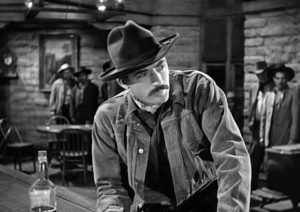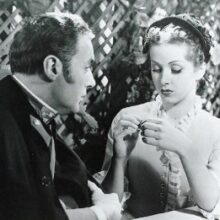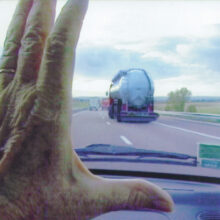
The western, that most American of film genres, reached its peak in the 1950s, when Hollywood reinvented its timeworn conventions for greater dramatic impact. The Gunfighter, released in 1950, directed by Henry King, is a good example of how much further westerns had come from the days of Tom Mix and Gene Autry.
Gregory Peck plays Jimmy Ringo, the fastest gun in the West, whose fame has become a curse, causing him to be the target of every young upstart with a gun, everywhere he goes. In the film’s first scene he is minding his own business at a saloon, only to be goaded into gunning down an insolent youth with a trigger finger. The boy’s three older brothers go after Ringo, who flees to the town of Caynenne, where he hopes to see his wife (Helen Westcott), now a schoolteacher, and their son. The town marshal (played by Millard Mitchell), a reformed outlaw and an old friend, tries to get Ringo to leave, while news of the gunfighter’s appearance causes crowds of curious onlookers to gather around the local saloon where he’s holed up.
This is a western that succeeds through the virtue of simplicity — most of the action takes place indoors, with Peck facing off against everybody in the Caynenne Saloon. The sets, costumes, and language are all very plain and matter-of-fact, striving for (and mostly achieving) historical realism. Although it seems like a small film, there’s a lot of big talent at work—along with the direction by the seasoned veteran King, the film boasts excellent photography by the great Arthur Miller, an Alfred Newman musical score, and an intelligent, and sometimes pungent, screenplay by William Bowers and Andre De Toth. At one point, a young punk says “I bet I’m faster than him,” to which one of his friends replies, “But if you’re not, can I have your saddle?”
Gregory Peck’s talents were best employed in parts of a certain understated range. Here he plays a man who has awakened to the fact that his life has been a waste, and must somehow find a way out. Peck does a great job, staying within himself and projecting the right mix of sullen menace with a desire for a better way of life. A lesser actor would have tried to make the gunfighter more likable, even heroic, and that was how Peck was usually typecast, but he plays everything close to the vest here, and it’s among his best work.
The Gunfighter takes the myth of the Western outlaw and finds a new wrinkle, and in so doing explores some interesting psychological territory. With extensive use of deep focus, the picture, for all its rough-hewn quality, attains a kind of harsh beauty. With its fatalistic mood, this movie could almost be classified as film noir. What is certain is that this is fine professional work, entertaining from beginning to end, and at times even stirring. The Gunfighter is available on DVD.






